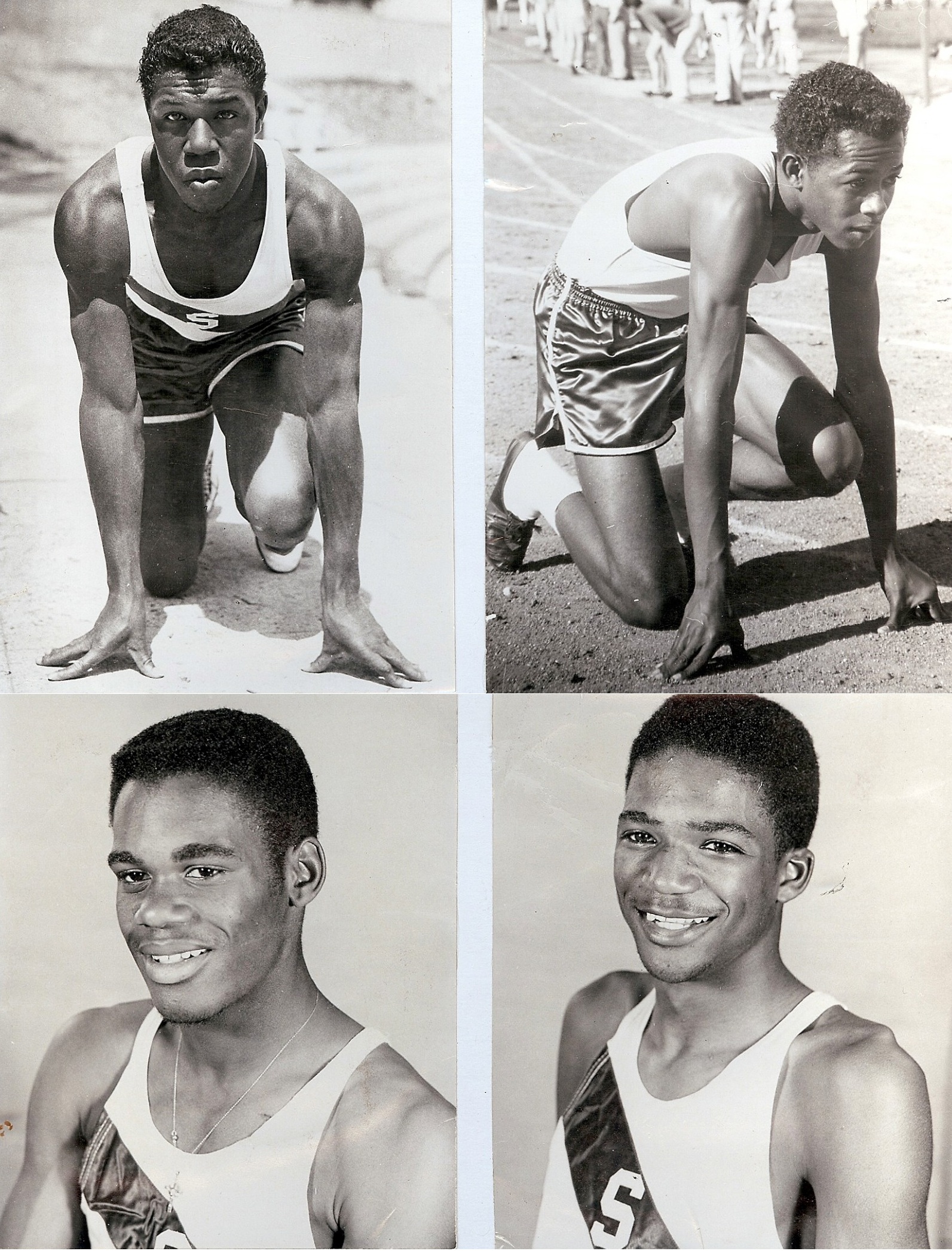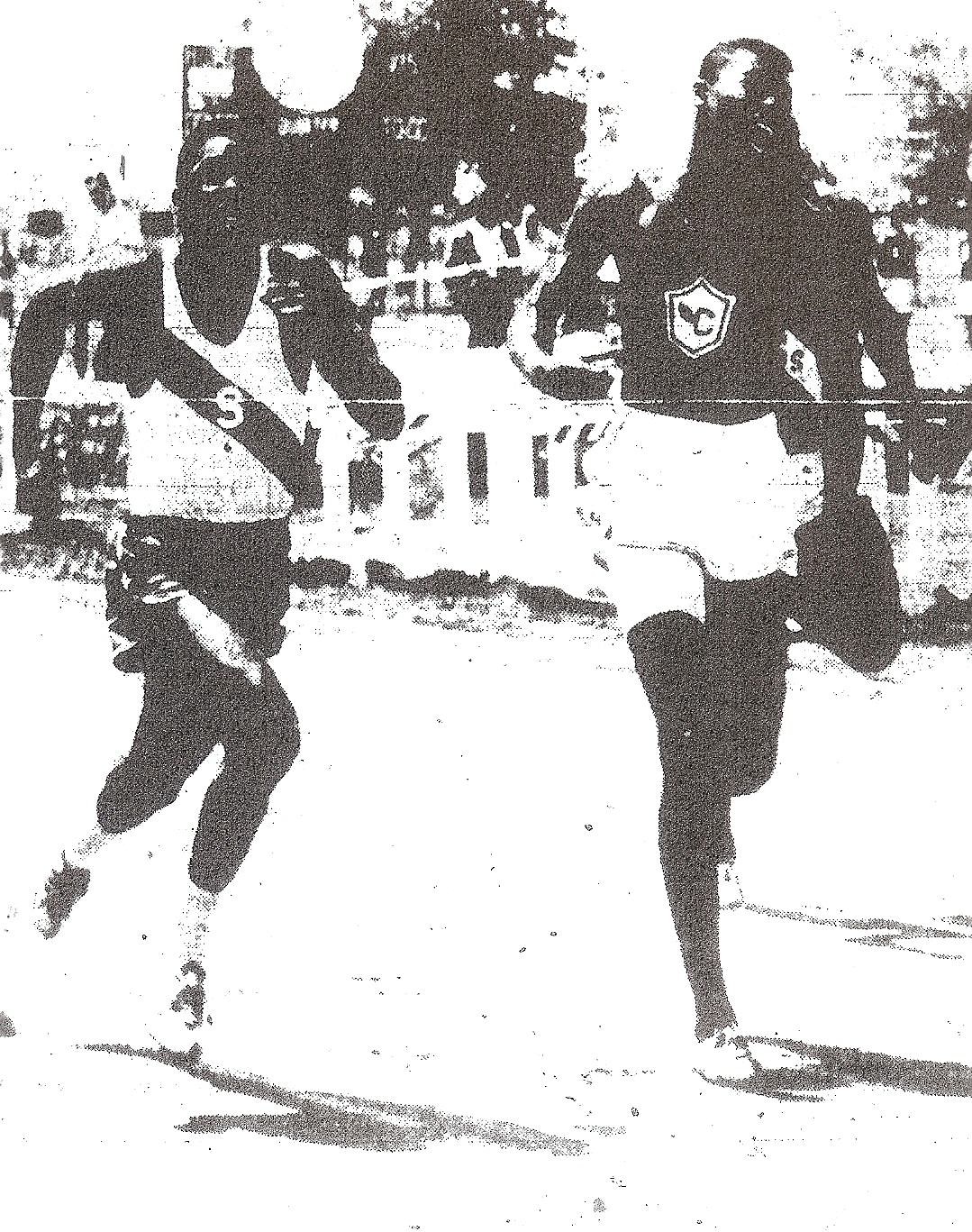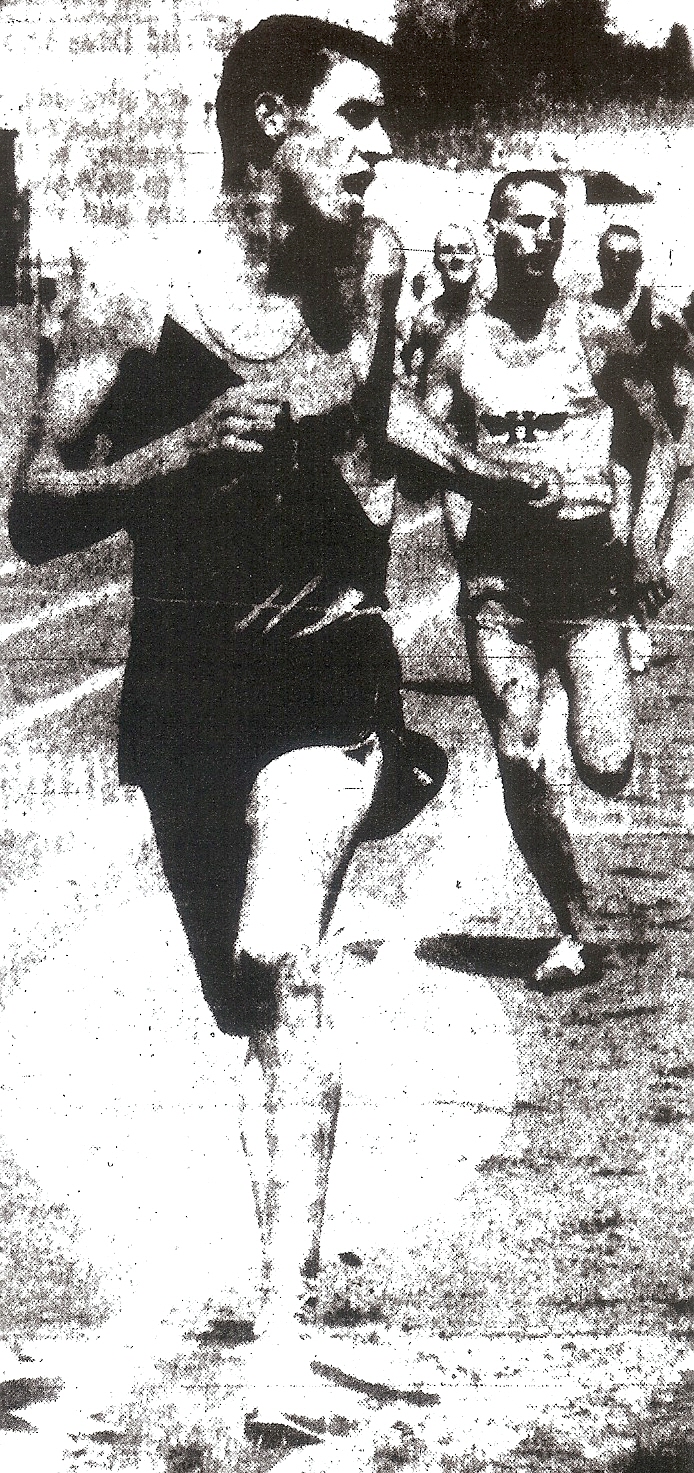1957: Cook’s and Cavers’ Great Day
Roscoe Cook, Bobby Staten, Willie Jordan, and Charles (Sugar Jet) Davis comprised a swift foursome of San Diego High athletes who surprised the field and brought home a Southern California track championship.
The biggest surprise was by Cook, who entered the season as the most important and accomplished of the quartet.
Some background:
Cook was the 1956 CIF Southern Section Class B sprint titlist, having run away from the field the previous spring with best times of :09.7 in the 100-yard dash, and :21.0 in the 220.
It was expected that Cook and Staten would dominate the short races and low hurdles and that Davis, one of the city’s best quartermilers, and Jordan, a complementary sprinter, would round out a championship 880-yard relay team.
A downpour shortly after the first race canceled the Southern Counties’ Invitational at Huntington Beach High in the first week in March, delaying the usual official beginning of the season.
With no early reading on what to expect, the Cavemen then prepared for a intersectional dual meet in Balboa Stadium with powerful Compton Centennial.
UNBEATEN AT HOME
Cook had never lost a race in San Diego but he was beaten in a :09.9 100 by Centennial’s tall, long-striding Preston Griffin, a newcomer to the Southern California scene.
Griffin also took the national lead with a 24-foot, 6 ¾-inch broad jump. Cook was third despite breaking a 19-year-old school record with a leap of 23-10. Griffin’s teammate, John Blaylock, was second at 23-11 in a remarkable competition.

The final and stunning indignity came in the 220 when Griffin, jogging the last 15 yards, eased to a :21.6 and Cook was a well-beaten third. Griffin also withstood a charge by Staten as Centennial won the 880-yard relay in 1:28.8 and the meet, 60 1/2-43 1/2.
Seven weeks later, Griffin blazed a :09.5 100 in a semifinals, qualifying meet and appeared unbeatable. On the same day Cook won a heat in a season-best: 09.8 in another divisional competition at Arroyo High in El Monte.
Cook quietly also served some notice as he took the measure of Alhambra’s Rusty Weeks, who’d run :09.6 the week before.
SHORT AND QUICK
After the loss to Griffin, San Diego coach Birt Slater put Cook on a training regimen of repeated starts and short dashes.
Cook would spot other San Diego sprinters five yards and then try to “eat ‘em up” inside 50 yards.
Teammates who offered the competition for Cook came up with the description of the exercise.
“We believed that if Roscoe could lead Griffin after fifty yards he stood a good chance of winning,” said Slater.

Rising 10,064 feet to the East, Mt. Baldy provided the backdrop on a warm, hazy afternoon, when the top athletes arrived at Chaffey High in Ontario for the Southern Section championships on May 25.
Centennial was the prohibitive favorite for the team championship and Griffin was favored in three events, 100, 220, and broad jump, plus the relay.
Cook and Griffin were side by side in the starting blocks as they took their marks for the century race. Kearny’s Ed Buchanan was next to Griffin.
‘EAT ‘EM UPS’ PAY OFF
Cook broke fast out of the blocks and led Griffin at 50 yards. The San Diego runner still was in front a yard from the finish line, but Griffin closed strongly.
Officials and time keepers huddled for several moments before Cook was declared the winner in :09.4, which broke the Southern California record by Griffin a week earlier and tied the national interscholastic mark set by Cleveland’s Jesse Owens in 1933.
Staten was second to Griffin in the 220 (Cook, who did not like the longer sprint, was fourth). The 6-foot, 2-inch Griffin rolled down the Chaffey straightaway in :20.3 to Staten’s :20.5 and bettered the national record, but the race had a wind reading of 4.83 miles per hour, over the allowable limit of 4.473.
On a day of records and outstanding performances, the 220 was the only race determined to be over the wind limit.
Staten also tied a national record of :18.5 in the 180-yard low hurdles, although San Bernardino’s Junior Howard edged Staten in the same time.

CAVEMEN LEADING
San Diego was leading in team scoring with 15 points entering the final event, but Centennial, which had 14 points, was favored in the 880 relay and had set a record of 1:27.1 the week before.
Cook and Davis positioned the Cavers but Jordan lost ground on the third leg. Centennial ran into trouble when it botched an exchange.
Staten was well off the pace after he got the baton from Jordan, but Staten’s :20.8 anchor 220 caught leaders Carl Skavarna of Chaffey and Charlie Miller of Long Beach Poly. All three teams clocked 1:27.3, but Staten reached the finish line first.
“Another coach timed Bobby in the relay,” said Slater. “By that time I couldn’t stand up.”
After an adjustment in the scoring for the 100, in which Cook and Griffin were declared tied for first following review of a film of the race, San Diego still was the team champion with 19 ½ points to Centennial’s 16 ½.
LET’S LOOK AT THE FILM
It was a stellar afternoon for area athletes.
–Mission Bay’s Jim Cerveny set a Southern Section record with a 1:53.3 victory in the 880 and would set the state record of 1:52.7 the following week in the state meet at Berkeley.
–Lincoln’s Luther Hayes edged Griffin in the broad jump at 23-11.
–Kearny’s Ed Buchanan was third in the 100 at :09.7 and third in the 220 at :21.0. Cook was fourth in :21.1.
–Grossmont’s Jim Wade was third in the shot put at 61-5 ¾, and Kearny’s Bob Reynolds tied for third in the pole vault at 12-6.
Three days after the meet, CIF commissioner Ken Fagans announced that a review of finish line photos showed that Cook and Griffin had dead heated.
Howard’s victory over Staten was upheld, and the placings in some of the lower classes had been adjusted. Sweetwater’s Jim Stewart was elevated to fourth from fifth in the B 220.
Although there had been some discussion of wind during the day, only Griffin’s 220 was recorded as wind-aided, but Cook’s and Staten’s hopes of sharing a national record were dashed.
Dick Bank, a Los Angeles track authority, historian, and high school contributor to Track and Field News, the sport’s publication of record, challenged the operation of the wind gauge at Chaffey and refused to accept any of the records, including the stunning :09.5 and :20.8 sprint times by Arcadia’s Tom Boswell in Class B.
Cook’s and Staten’s marks went into the record book as wind-aided.
SPIKE DUST
Roscoe Cook graduated from the University of Oregon after he tied the world record of :09.3 in the 100 in 1959 and the world indoor record of :06.1 in the 60-yard dash…Cook earned a P.H.D. in education from the University of Massachusetts and taught and counseled in the Los Angeles school district for 30 years…Bobby Staten was senior co-captain of the USC track team in 1961 and a collegiate standout in the low hurdles and races from the 100 to 440…Staten completed a long career in the Los Angeles Probation Department…Charles Davis acquired the nickname “Sugar Jet,” which was a popular breakfast cereal of that name…Davis was a 48-second quarter miler at San Diego State and went on to a career as a corporate executive in Los Angeles…Berkeley became only the third Northern school since 1930 to win the state team title, scoring 22 points while San Diego and Centennial tied for second with 10 each…Griffin won the 100 in :09.6…Doug Smith of Taft Union was second, Cook third, and Buchanan fourth, each in :09.7…Hayes won the broad jump at 23-8 1/2, Wade was third in the shot put at 60-7 3/4, and Staten was third in the 220 in :21.4 behind Griffin’s :21.1…the morning-afternoon competition took its toll on the Cavemen…Staten pulled out of the 180-yard low hurdles trials, which were 5 minutes after the 220 heats…San Diego recovered to finish second in the relay in 1:27.2, Berkeley the winner in 1:27….